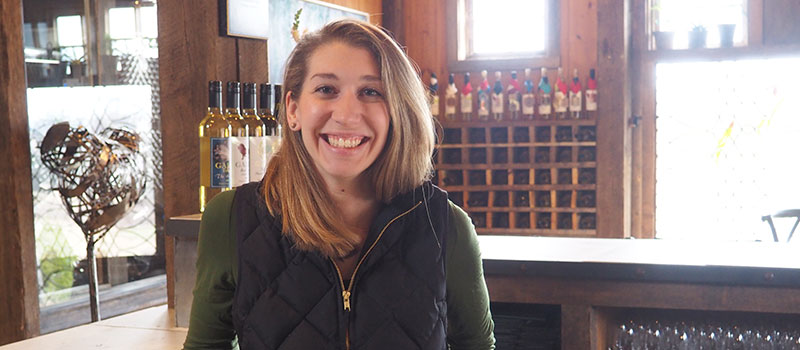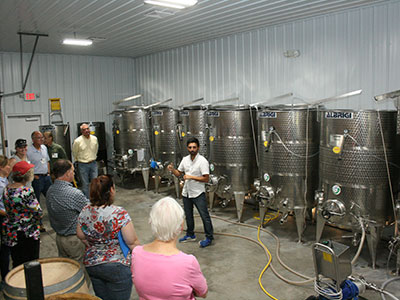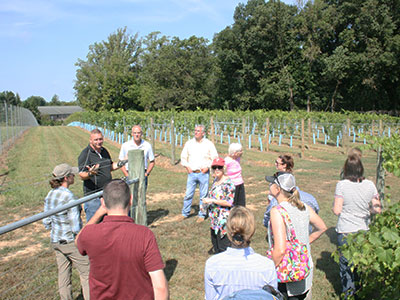Most wineries will have extensive productions facilities.
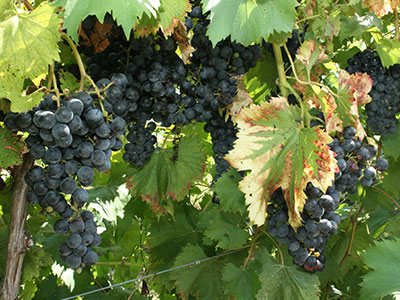
Many wineries grow some or all of their own grapes.
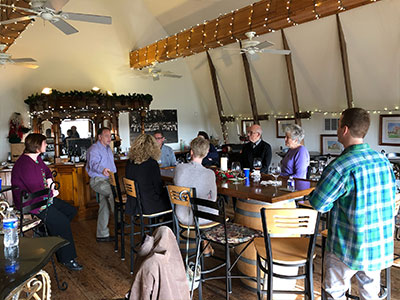
By bringing visitors, wineries can help tourism and economic development.
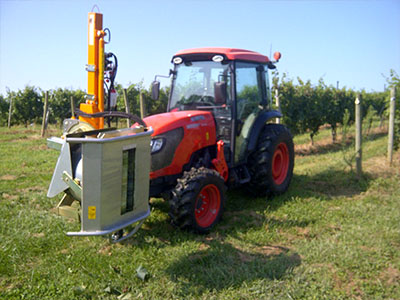
Many wineries are on agricultural land that qualifies for preservation.
How it Works
Wineries can use any fruit to produce wine but most commonly use grapes. A dozen wineries operate throughout Chester County and provide unique attractions to residents and visitors. According to Pennsylvania Wines, Pennsylvania has 14,000 acres of grapes and ranks 5th nationally in the amount of grapes grown (including juice grapes). The state also ranks 7th in the production of wine and 7th in number of wineries, with many of these wineries part of ten organized wine trails that wind throughout the state.
Wineries may have vineyards or orchards on location, or may source fruit to make their products. Wineries may incorporate additional uses in their production and distribution. Tasting rooms and associated retail sales may be found within a winery where customers can sample the wines that are available. Some wineries might include sales of products not made at the winery, and some might also include associated restaurants or other prepared food sales. Most wineries will include production facilities that involve crushing, fermenting, blending, aging, storage, and bottling.
Winery operations can be versatile in reaching customers through online platforms and brick and mortar retail shops. Some wineries are located in urban settings or include offsite tasting rooms in urban or suburban settings. Many wineries also hold special events or tours that attract large numbers of visitors within a relatively short time frame.
Municipalities can support established and new wineries and wine related businesses by ensuring their zoning ordinances are conducive to the success of these unique businesses.
Benefits
Economic Development
Wineries create new jobs both at the winery as well as in associated industries. For many communities, wineries have become destinations, drawing additional visitors and capital to their areas. Wineries can generate new municipal revenue through sales, hotel, property, and income taxes. The opportunity for agri-tourism also bolsters the agricultural industry as a whole by attracting visitors to an area who may visit multiple consumer-focused agricultural businesses.
Food System Support
Wineries can partner with food trucks to provide food service, which creates opportunities for new business startups, jobs, and potential brick and mortar commercial restaurants. Additionally, wineries can use local ingredients for production and are often advocates for "farm to table" in food associated with their wineries.
Community Building
Wineries often hold additional events on site, which can create opportunities for interaction among visitors and provide spaces for artistic activities.
Adaptive Reuse
Wineries' unique space needs can make historic building renovation financially feasible. Many wineries, both locally and globally, have preserved historic buildings, using the building character as a draw for customers.
Agricultural Preservation
Wineries that grow the fruit used in their wine are potentially eligible for agricultural land preservation in Chester County. Existing farms can diversify their crop production by establishing a vineyard on location and either producing wine themselves or selling grapes or other fruit to a local producer. This can bring in more revenue to sustain their overall agricultural operations and is one way farms can stay economically viable.
Agriculturally-zoned areas may be appropriate for wineries.
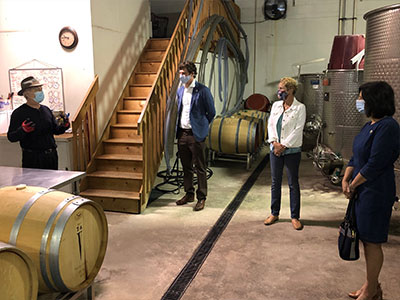
Commercially and industrially-zoned areas are frequently good districts for wineries.
Get Started
Municipalities that are interested in strengthening their agricultural base or in attracting visitors should include wineries in their planning efforts. This should begin with the municipal comprehensive plan, which can define areas for agricultural preservation and business growth, as well as visitor-oriented locations, such as commercial villages and downtowns. Wineries can be a key component of these plans.
Municipalities should then determine where they wish to permit wineries (by zoning district), how they wish to permit them (by-right, conditional use, special exception, as accessory uses), and any additional requirements (hours of operation, noise/outdoor dining, loading and unloading, etc.). Municipalities should consult with their solicitor about specific requirements of the PA Liquor Control Board and the Chester County Health Department with respect to winery licensing and permits and associated food service licensing (such as restaurants or food trucks).
Municipalities should understand and regulate wineries and their associated businesses appropriately. Individual wine businesses may be better suited to different zoning districts depending on the intensity of the business operation. For example, a tasting room would typically have lower impact with regard to production, warehousing, waste, and deliveries, and could appropriately be located on a historic main street. A regional winery typically would need a larger facility and would primarily involve production, warehousing, and delivery/shipping, which may be more appropriate for agricultural, higher intensity commercial, or light industrial zones.
A winery that grows its fruit on site could be very appropriate for agricultural areas, particularly in Chester County, which has direct access to a large and high-income metropolitan area. In these cases, municipalities will need to allow uses that can make the winery successful, such as tasting rooms, retail sales, and event space.
Regulatory provisions for wineries should address appropriate standards by defining wineries and vineyards, requiring adequate sewage disposal and water supply, requiring appropriate parking, determining operating hours, regulating signage, controlling special events, and identifying accessory uses.
Considerations
Infrastructure
Wineries can have impacts on the municipal water and sewer system in terms of water needed for cleaning equipment and the disposal of liquids after production. Gas and electric service can also be potential challenges for wineries. Wineries' deliveries and shipping may increase roadway use, waste and water disposal, and noise.
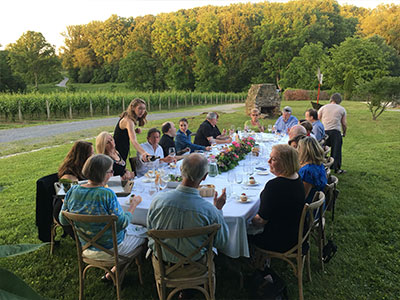
Many wineries hold special events that bring visitors and potential impacts on neighbors.
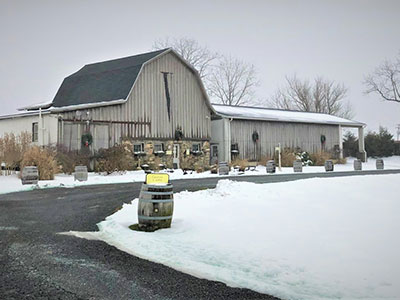
Wineries should preserve historic buildings or add new buildings that fit into the local community character.
Warehousing/Storage
Wineries will need sufficient space for storing products for production in addition to bottles, or barrels, and room to fill and store these products.
Delivery/Shipping
Outside of tasting rooms, wineries may have impacts for deliveries and shipping of materials for production (bottles, barrels). As wineries become more successful the size, scale, and frequency of deliveries/shipping may increase.
Location and Impacts on Adjacent Uses
There are potential impacts (crowds, noise, traffic, light) associated with some wine businesses that may affect where and how a municipality chooses to permit them. For example, limiting operating hours for certain activities (music, bands, games), particularly when they are permitted outdoors, should be considered in areas with nearby residential uses. In other cases, municipalities may impose regulations that unintentionally impact smaller scale wineries, such as exceptionally large setbacks between a winery and residential uses or districts. In general, commercial and industrial districts and downtown areas where restaurants are permitted would usually be appropriate for a winery, and many agricultural areas might also be appropriate. Ordinance standards need to be tailored according to the location and intensity of the specific use being regulated.
Historic Preservation
When located within an existing historic building, wineries should be sensitive to the building's character-defining features. Similarly, proposed buildings should be sensitive to their surrounding historic context. In both cases, sensitivity to the history of an area can improve the project's uniqueness as well as its success and marketability.
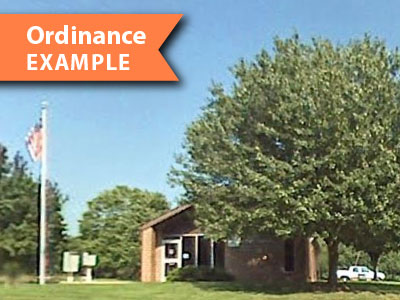
Franklin Township
Franklin Township allows wineries in its commercial district and as an accessory use to agriculture, with additional standards for special events.
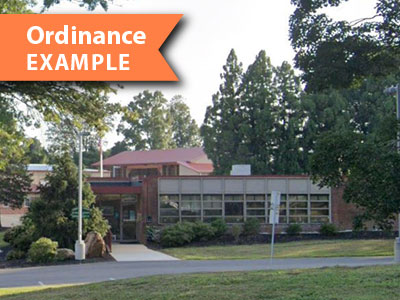
London Grove Township
London Grove Township permits wineries in its industrial district.

Spring Township, Berks County
Spring Township in Berks County has standards for both wineries and micro-wineries.

El Dorado County, California
California has a thriving wine industry and many example ordinances, including this example from El Dorado County.


